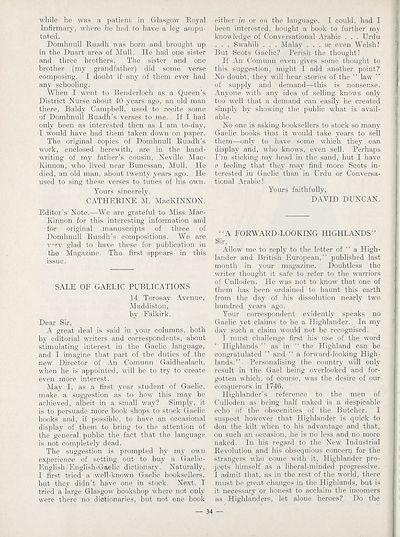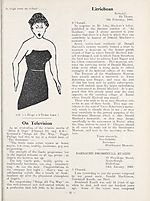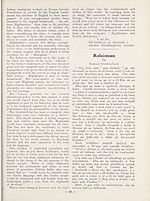An Comunn Gàidhealach Publications > Gaidheal > Volumes 58--62(part), January, 1963--March 1967
(450) Page 34
Download files
Complete book:
Individual page:
Thumbnail gallery: Grid view | List view

while he was a patient in Glasgow Royal
Infirmary* where he had to have a leg ampu¬
tated.
Domhnull Ruadh was born and brought up
in the Duart area of Mull. He had one sister
and three brothers. The sister and one
brother (my grandfather) did some verse
composing. I doubt if any of them ever had
any schooling.
When I went to Benderloch as a Queen’s
District Nurse about 40 years ago, an old man
there, Baldy Campbell, used to recite some
of Domhnull Ruadh’s verses to me. If I had
only been as interested then as I am to-day,
I would have had them taken down on paper.
The original copies of Domhnull Ruadh’s
work, enclosed herewith, are in the hand¬
writing of my father’s cousin, Neville Mac¬
Kinnon, who lived near Bunessan, Mull. He
died, an old man, about twenty years ago. He
used to sing these verses to tunes of his own.
Yours sincerely,
CATHERINE M. MacKINNON.
Editor’s Note.—We are grateful to Miss Mac¬
Kinnon for this interesting information and
for original manuscripts of three of
Domhnull Ruadh’s compositions. We are
v°rv glad to have these for publication in
the Magazine. The first appears in this
issue.
SALE OF GAELIC PUBLICATIONS
14 Torosay Avenue,
Maddiston,
by Falkirk.
Dear Sir,
A great deal is said in your columns, both
by editorial writers and correspondents, about
stimulating interest in the Gaelic language,
and I imagine that part of the duties of the
new Director of An Comunn Gaidhealach,
when he is appointed, will be to try to create
even more interest.
May I, as a first year student of Gaelic,
make a suggestion as to how this may be
achieved, albeit in a small way? Simply, it
is to persuade more book shops to stock Gaelic
books and, if possible, to have an occasional
display of them to bring to the attention of
the general public the fact that the language
is not completely dead.
The suggestion is prompted by my own
experience of setting out to buy a Gaelic-
English/English-Gaelic dictionary. Naturally,
I first tried a well-known Gaelic booksellers,
but they didn’t have one in stock. Next, I
tried a large Glasgow bookshop where not only
were there no dictionaries, but not one book
either in or on the language. I could, had I
been interested, bought a book to further my
knowledge of Conversational Arabic . . . Urdu
. . . Swahili . . . Malay ... or even Welsh!
But Scots Gaelic? Perish the thought!
If An Comunn even gives some thought to
this suggestion, might I add another point?
No doubt, they will hear stories of the “ law ”
of supply and demand—this is nonsense.
Anyone with any idea of selling knows only
too well that a demand can easily be created
simply by showing the public what is avail¬
able.
No one is asking booksellers to stock so many
Gaelic books that it would take years to sell
them—only to have some which they can
display and, who knows, even sell. Perhaps
I’m sticking my head in the sand, but I have
a feeling that they may find more Scots in¬
terested in Gaelic than in Urdu or Conversa¬
tional Arabic!
Yours faithfully,
DAVID DUNCAN.
“A FORWARD-LOOKING HIGHLANDS”
Sir,
Allow me to reply to the letter of ‘‘ a High¬
lander and British European,” published last
month in your magazine. Doubtless the
writer thought it safe to refer to the warriors
of Culloden. He was not to know that one of
them has been ordained to haunt this earth
from the day of his dissolution nearly two
hundred years ago.
Your correspondent evidently speaks no
Gaelic yet claims to be a Highlander. In my
day such a claim would not be recognised.
I must challenge first his use of the word
‘ Highlands ” as in ‘‘ the Highland can be
Congratulated ” and “ a forward-looking High¬
lands.” Personalising the country will only
result in the Gael being overlooked and for¬
gotten which, of course, was the desire of our
conquerors in 1746.
Highlander’s reference to the men of
Culloden as being half naked is a despicable
echo of the obscenities of the Butcher. I
suspect however that Highlander is quick to
don the kilt when to his advantage and that,
on such an occasion, he is no less and no more
naked. In his regard to the New Industrial
Revolution and his obsequious concern for the
strangers who come with it, Highlander pro¬
jects himself as a liberal-minded progressive.
I admit that, as in the rest of the world, there
must be great changes in the Highlands, but is
it necessary or honest to acclaim the incomers
as Highlanders, let alone heroes? Do the
— 34 —
Infirmary* where he had to have a leg ampu¬
tated.
Domhnull Ruadh was born and brought up
in the Duart area of Mull. He had one sister
and three brothers. The sister and one
brother (my grandfather) did some verse
composing. I doubt if any of them ever had
any schooling.
When I went to Benderloch as a Queen’s
District Nurse about 40 years ago, an old man
there, Baldy Campbell, used to recite some
of Domhnull Ruadh’s verses to me. If I had
only been as interested then as I am to-day,
I would have had them taken down on paper.
The original copies of Domhnull Ruadh’s
work, enclosed herewith, are in the hand¬
writing of my father’s cousin, Neville Mac¬
Kinnon, who lived near Bunessan, Mull. He
died, an old man, about twenty years ago. He
used to sing these verses to tunes of his own.
Yours sincerely,
CATHERINE M. MacKINNON.
Editor’s Note.—We are grateful to Miss Mac¬
Kinnon for this interesting information and
for original manuscripts of three of
Domhnull Ruadh’s compositions. We are
v°rv glad to have these for publication in
the Magazine. The first appears in this
issue.
SALE OF GAELIC PUBLICATIONS
14 Torosay Avenue,
Maddiston,
by Falkirk.
Dear Sir,
A great deal is said in your columns, both
by editorial writers and correspondents, about
stimulating interest in the Gaelic language,
and I imagine that part of the duties of the
new Director of An Comunn Gaidhealach,
when he is appointed, will be to try to create
even more interest.
May I, as a first year student of Gaelic,
make a suggestion as to how this may be
achieved, albeit in a small way? Simply, it
is to persuade more book shops to stock Gaelic
books and, if possible, to have an occasional
display of them to bring to the attention of
the general public the fact that the language
is not completely dead.
The suggestion is prompted by my own
experience of setting out to buy a Gaelic-
English/English-Gaelic dictionary. Naturally,
I first tried a well-known Gaelic booksellers,
but they didn’t have one in stock. Next, I
tried a large Glasgow bookshop where not only
were there no dictionaries, but not one book
either in or on the language. I could, had I
been interested, bought a book to further my
knowledge of Conversational Arabic . . . Urdu
. . . Swahili . . . Malay ... or even Welsh!
But Scots Gaelic? Perish the thought!
If An Comunn even gives some thought to
this suggestion, might I add another point?
No doubt, they will hear stories of the “ law ”
of supply and demand—this is nonsense.
Anyone with any idea of selling knows only
too well that a demand can easily be created
simply by showing the public what is avail¬
able.
No one is asking booksellers to stock so many
Gaelic books that it would take years to sell
them—only to have some which they can
display and, who knows, even sell. Perhaps
I’m sticking my head in the sand, but I have
a feeling that they may find more Scots in¬
terested in Gaelic than in Urdu or Conversa¬
tional Arabic!
Yours faithfully,
DAVID DUNCAN.
“A FORWARD-LOOKING HIGHLANDS”
Sir,
Allow me to reply to the letter of ‘‘ a High¬
lander and British European,” published last
month in your magazine. Doubtless the
writer thought it safe to refer to the warriors
of Culloden. He was not to know that one of
them has been ordained to haunt this earth
from the day of his dissolution nearly two
hundred years ago.
Your correspondent evidently speaks no
Gaelic yet claims to be a Highlander. In my
day such a claim would not be recognised.
I must challenge first his use of the word
‘ Highlands ” as in ‘‘ the Highland can be
Congratulated ” and “ a forward-looking High¬
lands.” Personalising the country will only
result in the Gael being overlooked and for¬
gotten which, of course, was the desire of our
conquerors in 1746.
Highlander’s reference to the men of
Culloden as being half naked is a despicable
echo of the obscenities of the Butcher. I
suspect however that Highlander is quick to
don the kilt when to his advantage and that,
on such an occasion, he is no less and no more
naked. In his regard to the New Industrial
Revolution and his obsequious concern for the
strangers who come with it, Highlander pro¬
jects himself as a liberal-minded progressive.
I admit that, as in the rest of the world, there
must be great changes in the Highlands, but is
it necessary or honest to acclaim the incomers
as Highlanders, let alone heroes? Do the
— 34 —
Set display mode to:
![]() Universal Viewer |
Universal Viewer | ![]() Mirador |
Large image | Transcription
Mirador |
Large image | Transcription
| An Comunn Gàidhealach > An Comunn Gàidhealach Publications > Gaidheal > Volumes 58--62(part), January, 1963--March 1967 > (450) Page 34 |
|---|
| Permanent URL | https://digital.nls.uk/127154181 |
|---|
| Description | This contains items published by An Comunn, which are not specifically Mòd-related. It includes journals, annual reports and corporate documents, policy statements, educational resources and published plays and literature. It is arranged alphabetically by title. |
|---|
| Description | A collection of over 400 items published by An Comunn Gàidhealach, the organisation which promotes Gaelic language and culture and organises the Royal National Mòd. Dating from 1891 up to the present day, the collection includes journals and newspapers, annual reports, educational materials, national Mòd programmes, published Mòd literature and music. |
|---|---|
| Additional NLS resources: |
|

